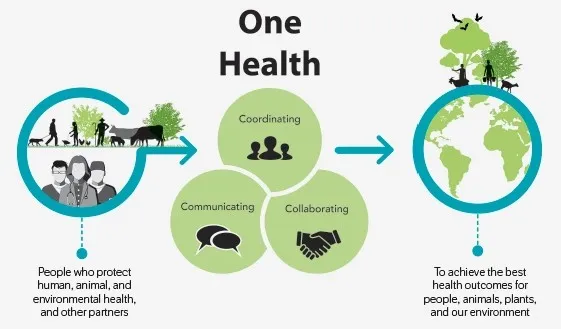One Health emphasises interconnectedness of human, animal and environmental health. The concept of One Health recognizes that the health of people is closely connected to the health of animals and the shared environment. The concept is not new, but has become more important due to emergence of novel pathogens from animals and occurrence of disease outbreaks and pandemics in humans.
Severe Acute Respiratory Syndrome, Middle East Respiratory Syndrome, ebola, zika, avian flu, swine flu, that affect humans and animals, COVID-19 pandemic became the centre of focus in recent times.
As COVID-19 was declared a public health emergency of international concern that devastated worldwide health sectors and economy, vast attention has been given to its pathobiology, prevention and control measures at all levels.
Being zoonotic disease with diverse host range, interdisciplinary approaches helped in curbing the pandemic. This helped in bringing together diverse disciplines involved at various levels of bio-control strategy and enforcing a multidisciplinary approach which forms the basis of One Health concept.
There have been disease pathogens originating from animals and affecting humans in past too. However these animal-origin diseases are on the rise now. More than 60% of the diseases affecting humans are of zoonotic nature and upto 75% of new or emerging infectious diseases are zoonotic in origin. Every year 3 new human pathogens are discovered.

Scientists estimate that more than 6 out of every 10 known infectious diseases in people can be spread from animals, and 3 out of every 4 new or emerging infectious diseases in people come from animals. Globally, about one billion cases of illness and millions of deaths occur every year from zoonoses.
One Health approach addresses the threats emanating at human-animal-environment interface besides public health concerns including antimicrobial resistance, environmental health, food safety, mental health, vector-borne diseases, zoonotic diseases, and much more.
It provides platform for joint efforts in One Health education and awareness. Experts and community can collaborate, communicate and coordinate with partners working in animal, human, and environmental health as well as other relevant areas that form an essential part of the One Health approach.
Medical and veterinary fraternity along with environmental, socio-political authorities and experts from other fields can help in fostering approaches of One Health concept.
Realising the importance of One Health, Sher-e-Kashmir University of Agricultural Sciences and Technology of Kashmir (SKUAST-K), Sher-e-Kashmir Institute of Medical Sciences (SKIMS), Soura and Government Medical College (GMC) Srinagar recently signed a declaration on One Health at Faculty of Veterinary Sciences and Animal Husbandry (FVSc and AH) Shuhama during a weeklong event on policy planning in One Health. The event was attended by national and international experts and stressed for establishing a School of One Health in Jammu and Kashmir.
Memorandums of understanding (MoUs) were also signed by the SKUAST-K, SKIMS and GMC for joint or collaborative academic and research endeavours. The establishment of School of One Health will put UT of J & K among the list of first few states/UTs in the country to have such a unified platform for putting joint efforts for improving quality of public life.
The collaborative working atmosphere can help in deciphering various health maladies yet to be investigated in this part of the world. It will also provide platform for joint awareness and action against various public health issues originating from agriculture, animal husbandry or medical fields and risking the health and lives of animals, plants or people by posing constant threats.
Besides zoonotic diseases, antimicrobial resistance, drug residues, agrochemical residues, or rising canine population are some of the visible issues that must be catered to safeguard public health and environment, and One Health seems to be the only rostrum that can provide solution.
Involving other stake holders of One Health in future including agriculturalists, environmentalists, geologists, meteorologists, municipalities, and experts from allied fields is a prerequisite and much needed initiative to be undertaken for solving problems faced by the people.
Not only infectious diseases, but other diseases or adversaries affecting livestock and plant health, and impeding productivity causing economic losses to farmers and food insecurity to people also needs to be addressed. This includes disease outbreaks, pest infestations, floods, droughts, untimely snow falls and many more natural and man-made calamities that starve the masses and strangulate the public health.
SKUAST-K under the leadership of Prof. Nazir Ahmad Ganai, Vice Chancellor has taken a leap in this direction and the approach of One Health seems becoming reality by involving other stake holders time and again in various events held at the university or its campuses and positive vibrations from medical, veterinary and allied fraternities have set the tone for working together under One Health for the betterment of people.
The initiatives taken for One Health have already been appreciated by experts from World Bank who visited SKUAST-K recently. Let’s hope that establishment of school of One Health becomes a reality, and it will be a dream come true for many professionals to work together for better animal, human and ecosystem health.
Dr. Mohammad Iqbal Yatoo, Assistant Professor, FVSc and AH Shuhama
Dr. Ajaz Ahmad Dar, Head, Preventive Medicine Division, FVSc and AH Shuhama






